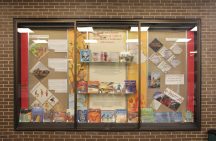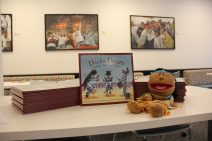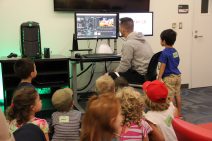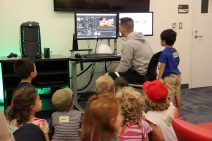The UCBA Library will be closed Friday, August 10th for facility maintenance Continue reading
Monthly Archives: July 2018
Recordkeeping and climate change
The science and history of climate change is intrinsically tied up with the practice of recordkeeping. In climate change conversations we often talk about “records” as in, “the hottest summer on record” or “a record level of flooding.” But those notable milestone records do not reveal themselves – they are revealed because of bits of data, created through the practice of observational recordkeeping, constituting a baseline that makes notable records possible.
One of the longest running data sets related to climate change are the Mauna Loa observatory records from Hawaii. These measurements, still carried out today, record atmospheric carbon dioxide concentrations, and were begun by Charles Keeling in 1958. The resulting diagram of the measurements, popularly known as the Keeling curve, shows an unmistakable rise in atmospheric concentration of carbon dioxide since it began. The Keeling curve is one of the most important pieces of documentary evidence in demonstrating the phenomenon of climate change, and human contribution towards creating climate change through increased greenhouse gas emissions.

The phenomena of climate change is all around us today. But it took decades of maintaining meticulous observational data records, and unearthing other forms of data through historical climate surrogate or proxy records, for climate change to enter mainstream scientific consciousness, let alone popular culture. Scientists had been discussing climate change in disciplinary publications and conferences since the 1960s. But climate change did not begin to enter mainstream conversation or awareness until the mid-1980s. After 1985, various phrases like climate change, global warming, and greenhouse gases began to appear in popular culture. An example of this can be seen in looking at the Google Books Ngram viewer, which registers phrases that appear in its corpus of 5 million digitized books. Around 1986, a major rise begins to take shape, and it gains major steam through the late 1980s.
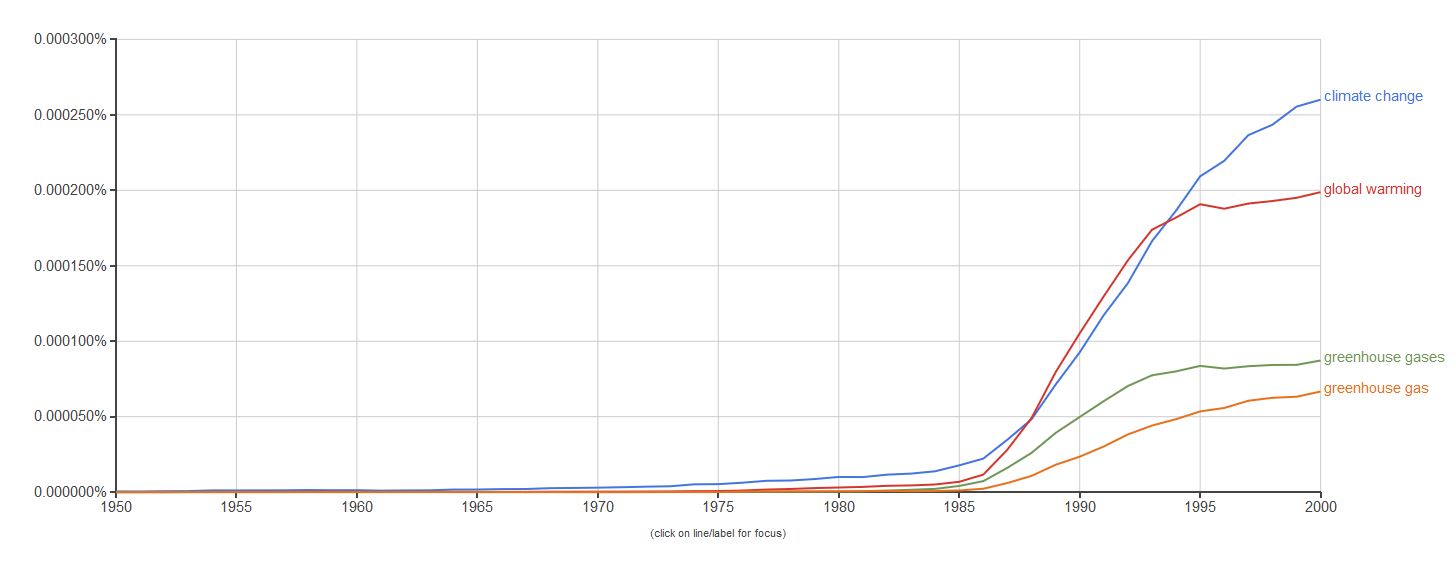
So what happened in the mid-80s? Several landmark events. One was the Montreal Protocol, which developed international cooperation in reducing the use of chloroflourocarbons (CFCs), which had contributed to the ozone hole. The awareness and international response to the ozone hole helped the public understand the degree to which human activity could adversely impact the environment. Then in 1988, a NASA scientist named James Hansen appeared before Congress during unusually hot summer weather to give testimony that global climate change was happening due to the use of fossil fuels, and that the United States needed to prepare for it.
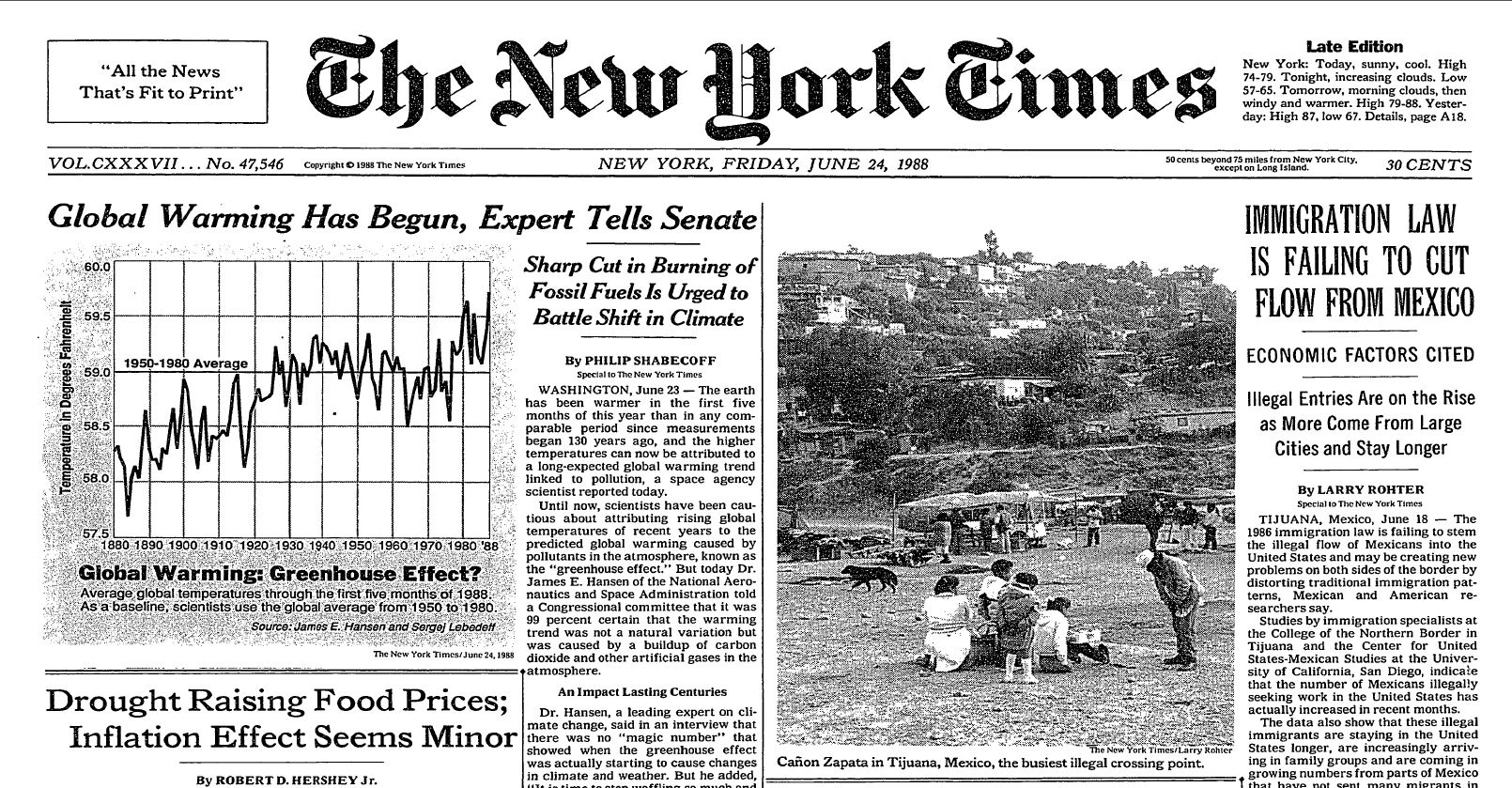
The New York Times reported that “Dr. Hansen, who records temperatures from readings at monitoring stations around the world, had previously reported that four of the hottest years on record occurred in the 1980’s. Compared with a 30-year base period from 1950 to 1980, when the global temperature averaged 59 degrees Fahrenheit, the temperature was one-third of a degree higher last year. In the entire century before 1880, global temperature had risen by half a degree, rising in the late 1800’s and early 20th century, then roughly stabilizing for unknown reasons for several decades in the middle of the century.” Until this time climate scientists had been hesitant to call for major public policy changes towards averting climate disaster. Hansen’s examination of over 100 years of weather station records led to his determination that global temperature rise was on enough of an upward trajectory than the alarm bell had to be rung.
Jeremy Berberich joins UC Libraries as the Associate Director of Business Affairs
Today, Jeremy Berberich joined UC Libraries as the associate director of business affairs. Jeremy comes to UC from Northern Kentucky University where he was the business officer for the College of Health Professions. He previously served as associate vice president for Knowledge Management at Gateway Community and Technical College and prior to that as a reference librarian and associate director for library and information services at Gateway. Jeremy holds a BA in political science with a minor in economics from the University of Louisville, an MLIS from the University of Kentucky and an MBA from Northern Kentucky University.
Jeremy will be a member of the Dean’s Cabinet and will lead the Business Office and HR operations.
Welcome, Jeremy, to UC Libraries.
Greeks and Romans, Happy Halloween!
The Classics Library’s Welcoming Host Handing Out The Library Guide.
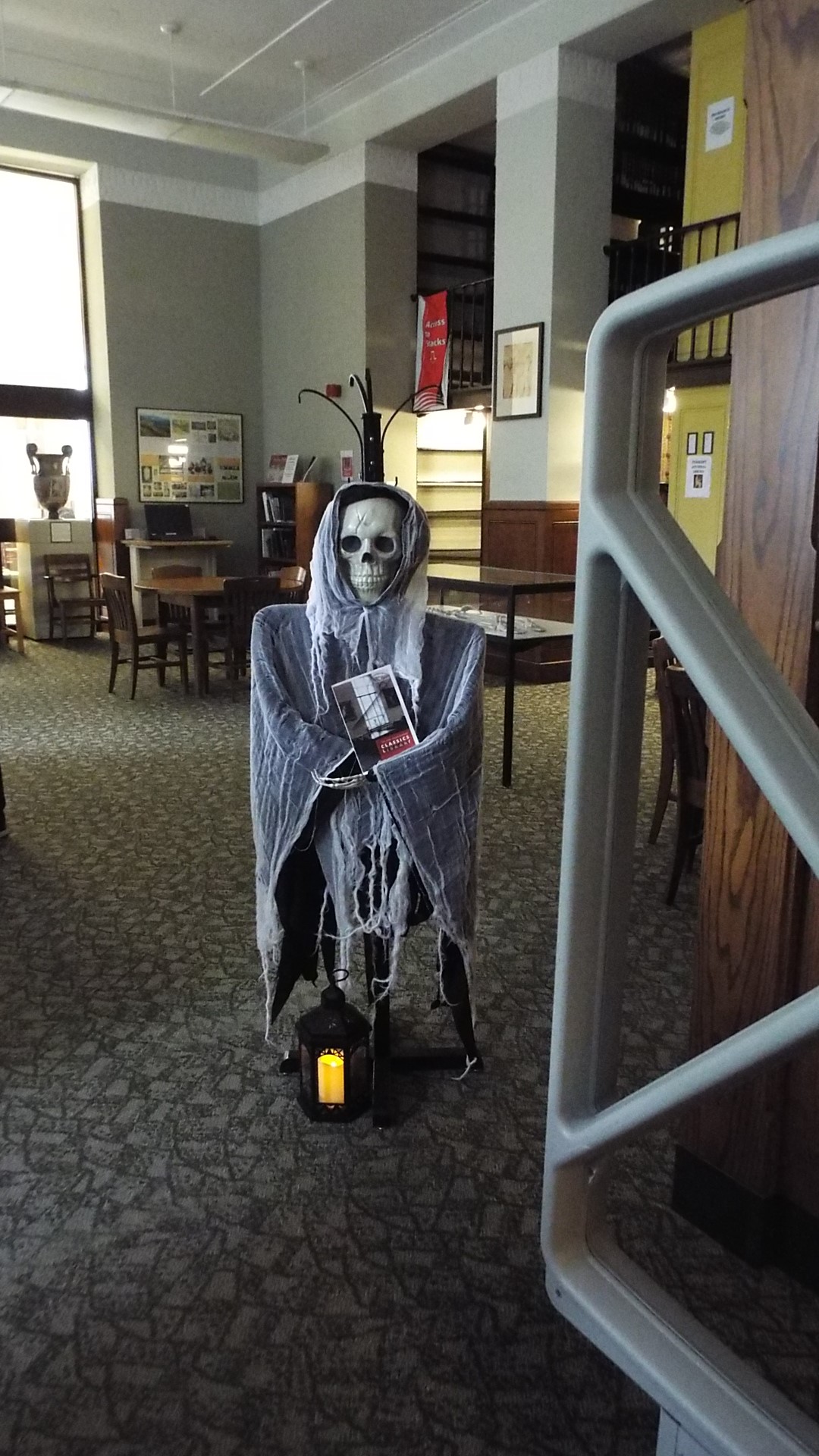
Excerpt from a dialogue between the slave Tranio and his master Theopropides from Plautus’ comedy Mostellaria, The Haunted House. Theopropides’ son has squandered his father’s fortune and the slave Tranio is trying to divert the father’s attention by asserting that the house is haunted before the money lenders arrive to claim it.
Tranio
“sed ecce quae illi in somnis mortuos:“ego transmarinus hospes sum Diapontius. hic habito, haec mi dedita est habitatio. nam me Accheruntem recipere Orcus noluit, quia praemature uita careo. per fidem deceptus sum: hospes me hic necauit isque medefodit insepultum clam [ibidem] in hisce aedibus, scelestus, auri causa. nunc tu hinc emigra. scelestae [hae] sunt aedes, impia est habitatio.” quae hic monstra fiunt anno uix possum eloqui” (496-505).
“But look what the dead man said to him in his sleep: “I am a guest from overseas, Diapontius. I live here, this dwelling place has been allotted to me: Orcus did not want to receive me into the Underworld because I lost my life before my time. I was deceived in violation of the obligations of hospitality: my host murdered me here and he secretly put me underground in this house without due rites, for the sake of gold, the criminal. Now move out from here. This house is under a curse, this dwelling place is defiled.” I could barely tell you in a year what apparitions take place here.”
Theopropides
“guttam haud habeo sanguinis, uiuom me accersunt Accheruntem mortui” (508-509).
“I don’t have a drop of blood! The dead are taking me to the Underworld while I’m still alive!”
The Classics Library’s staff shortage has temporarily been relieved by our most recent hire. Come meet Hecate.
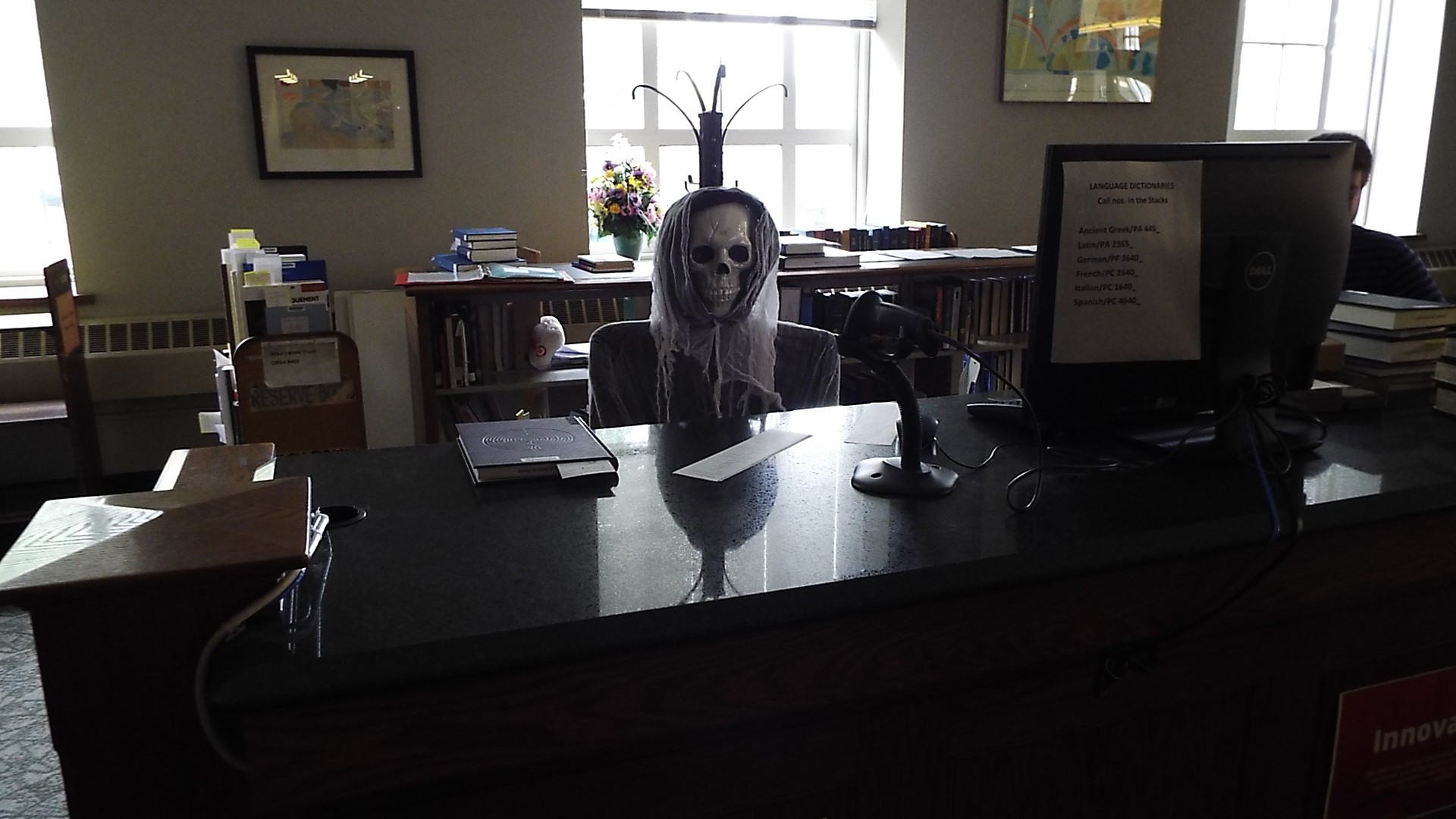
Excerpts from Homer’s Odyssey.
“αὐτὰρ ἐπεὶ ψυχὰς μὲν ἀπεσκέδασ᾿ ἄλλυδις ἄλλῃἁγνὴ Περσεφόνεια γυναικῶν θηλυτεράων, ἦλθε δ᾿ ἐπὶ ψυχὴ Ἀγαμέμνονος Ἀτρεΐδαο ἀχνυμένη· περὶ δ᾿ ἄλλαι ἀγηγέραθ᾿, ὅσσοι ἅμ᾿ αὐτῷ οἴκῳ ἐν Αἰγίσθοιο θάνον καὶ πότμον ἐπέσπον. ἔγνω δ᾿ αἶψ᾿ ἔμ᾿ ἐκεῖνος, ἐπεὶ πίεν αἷμα κελαινόν” (Od. 11. 385-90).
“When then holy Persephone had scattered this way and that the ghosts of the women, there came up the ghost of Agamemnon, son of Atreus, sorrowing, and round about him others were gathered, ghosts of all those who were slain with him in the house of Aegisthus, and met their fate. He knew me instantly, when he had drunk the dark blood.”
“δεδάκρυνται δὲ παρειαί, αἵματι δ᾿ ἐρράδαται τοῖχοι καλαί τε μεσόδμαι· εἰδώλων δὲ πλέον πρόθυρον, πλείη δὲ καὶ αὐλή, ἱεμένων Ἔρεβόσδε ὑπὸ ζόφον· ἠέλιος δὲοὐρανοῦ ἐξαπόλωλε, κακὴ δ᾿ ἐπιδέδρομεν ἀχλύς” (Od. 20. 353-57).
“sprinkled with blood are the walls and the fair panels. And full of ghosts is the porch, full also the court, ghosts hastening down to Erebus beneath the darkness, and the sun has perished out of heaven and an evil mist covers all.”
A recent archaeological find by the UC Classics Department of the skeleton of Roman poet Lucretius, proving that St. Jerome was correct in assigning the cause of the poet’s death to a love potion. Exhibition in the circulation area.
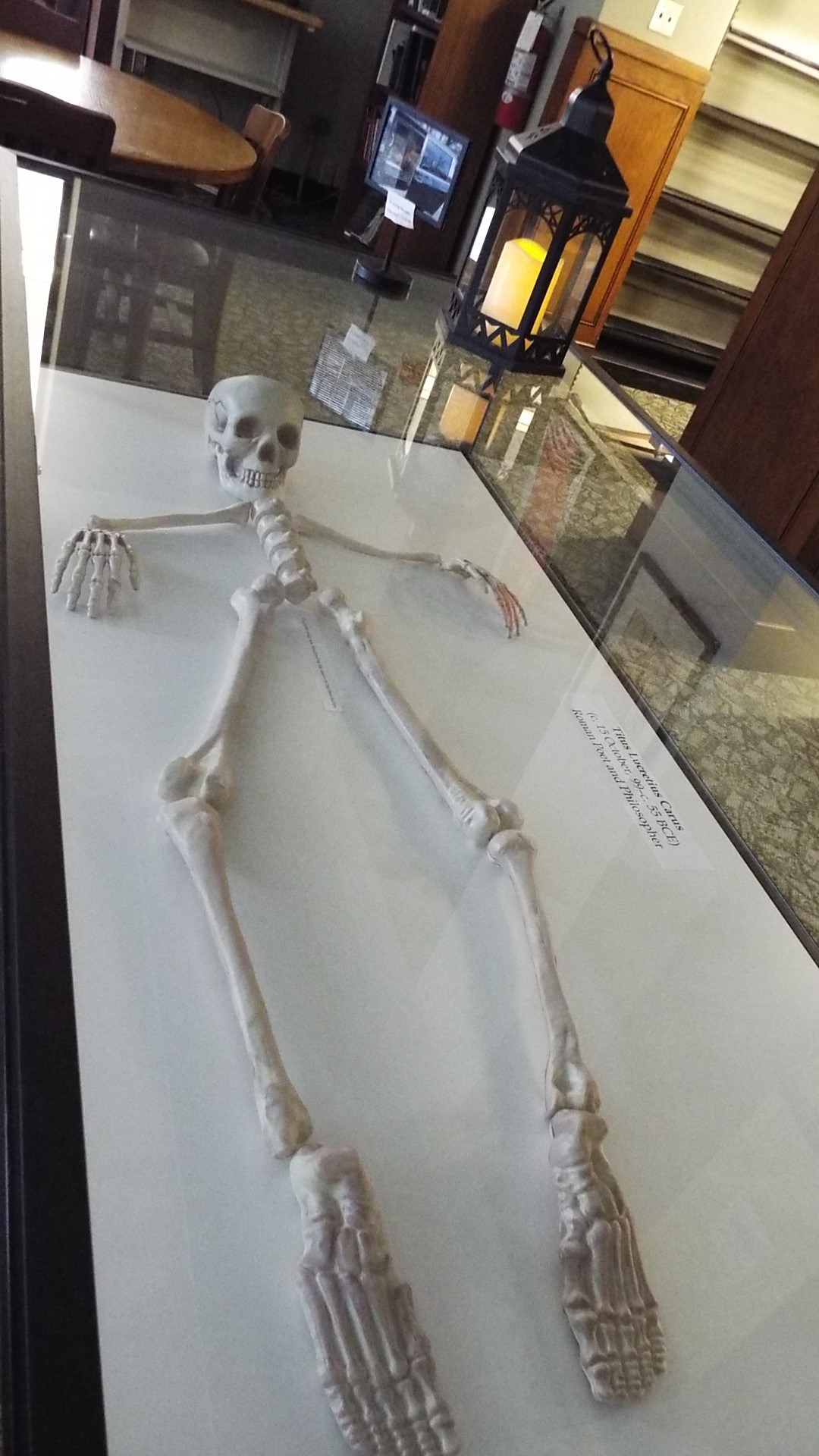
The ghost of Clytemnestra in Aeschylus’ Oresteia (Eumenides) when coming upon the furies fast asleep laments.
“ἐγὼ δ᾿ ὑφ᾿ ὑμῶν ὧδ᾿ ἀπητιμασμένη ἄλλοισιν ἐν νεκροῖσιν, ὧν μὲν ἔκτανον ὄνειδος ἐν φθιτοῖσιν οὐκ ἐκλείπεται, αἰσχρῶς δ᾿ ἀλῶμαι· προὐννέπω δ᾿ ὑμῖν ὅτιἔχω μεγίστην αἰτίαν κείνων ὕπο, παθοῦσα δ᾿ οὕτω δεινὰ πρὸς τῶν φιλτάτων οὐδεὶς ὑπέρ μου δαιμόνων μηνίεται κατασφαγείσης πρὸς χερῶν μητροκτόνων” (95-102).
“I am shunned in dishonor like this among the other dead, thanks to you. I am unceasingly taunted among the shades because of those I killed, and I wander disgraced; and I proclaim to you that I receive the greatest blame from them because, though I have suffered so grievously at the hands of those closest to me, none of the divinities is wrathful on my behalf, slaughtered as I have been by matricidal hands.”
A reference for the few…
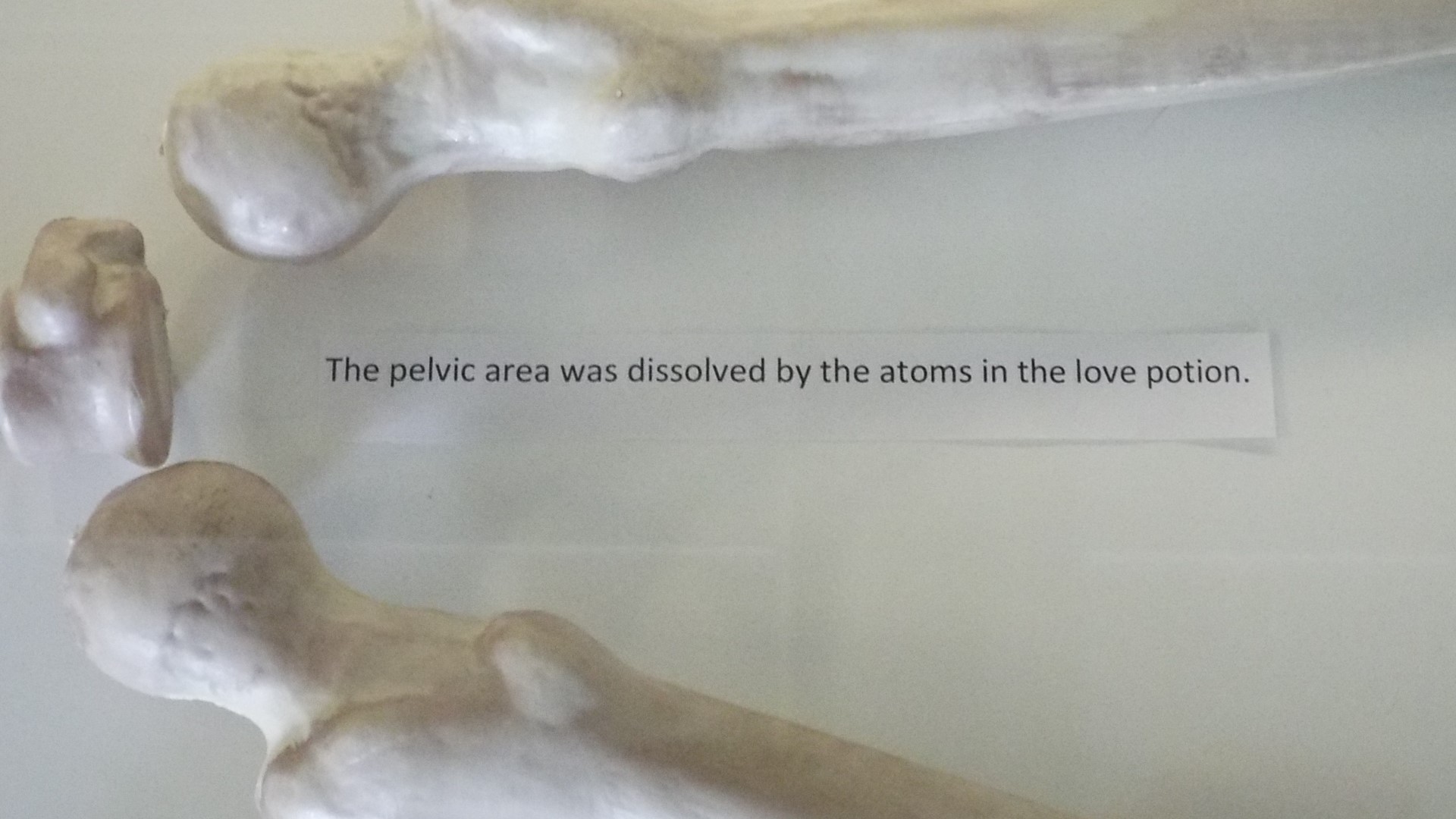
Excerpt from a letter (XXVII) to Lucinius Sura by Pliny the Younger.
“Initio, quale ubique, silentium noctis; dein concuti ferrum, vincula moveri. Ille non tollere oculos, non remittere stilum, sed offirmare animum auribusque praetendere. Tum crebrescere fragor, adventare et iam ut in limine, iam ut intra limen audiri. Respicit, videt agnoscitque narratam sibi effigiem.”
“At first there was nothing but the general silence of night; then came the clanking of iron and dragging of chains. He did not look up nor stop writing, but steeled his mind to shut out the sounds. Then the noise grew louder, came nearer, was heard in the doorway, and then inside the room. He looked round, saw and recognized the ghost described to him.”
The Library’s most recent book acquisitions.
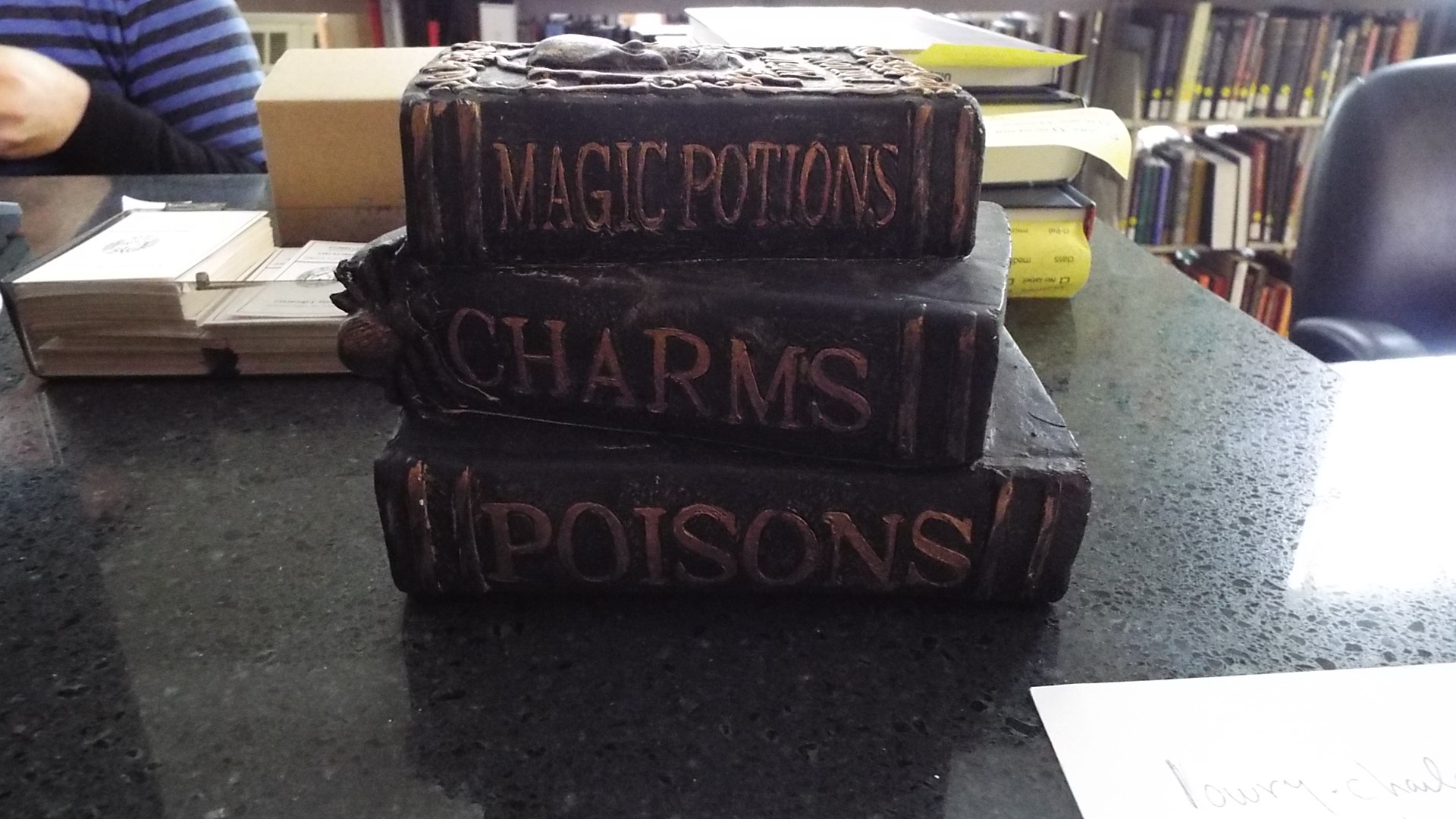
Dialogue between the ghost of Tantalus and Menippus from Lucian’s Dialogues of the Dead, illustrating that even in death “life” is a struggle.
ΤΑΝΤΑΛΟΣ
“Τοῦτ᾿ αὐτὸ ἡ κόλασίς ἐστι, τὸ διψῆν τὴν ψυχὴν ὡς σῶμα οὖσαν.”
ΜΕΝΙΠΠΟΣ
“Αλλὰ τοῦτο μὲν οὕτως πιστεύσομεν, ἐπεὶ φῂς κολάζεσθαι τῷ δίψει. τί δ᾿ οὖν σοι τὸ δεινὸν ἔσται; ἢ δέδιας μὴ ἐνδείᾳ τοῦ ποτοῦ ἀποθάνῃς; οὐχ ὁρῶ γὰρ ἄλλον ᾅδην μετὰ τοῦτον ἢ θάνατον ἐντεῦθεν εἰς ἕτερον τόπον.”
ΤΑΝΤΑΛΟΣ
“Ὀρθῶς μὲν λέγεις· καὶ τοῦτο δ᾿ οὖν μέρος τῆς καταδίκης, τὸ ἐπιθυμεῖν πιεῖν μηδὲν δεόμενον.”
Tantalus
“It’s just that that’s my punishment—that my ghost should be thirsty as if it were a body.”
Menippus
“Well, we’ll believe it, since you tell us you’re punished by thirst. But what do you find so terrible in that? Are you afraid of dying for lack of drink? I can’t see another Hades after this one, or a death hereafter taking us elsewhere.”
Tantalus
“You are quite right; but this is part of my sentence—to long to drink when I’ve no need.”
Cerberus as a puppy guarding the Gates of Hades.

HAPPY HALLOWEEN, GREEKS AND ROMANS!
FROM THE STAFF OF THE CLASSICS LIBRARY
Reflections on Library Leadership Ohio 2018
By Hong Cheng, Michelle McKinney and Craig Person
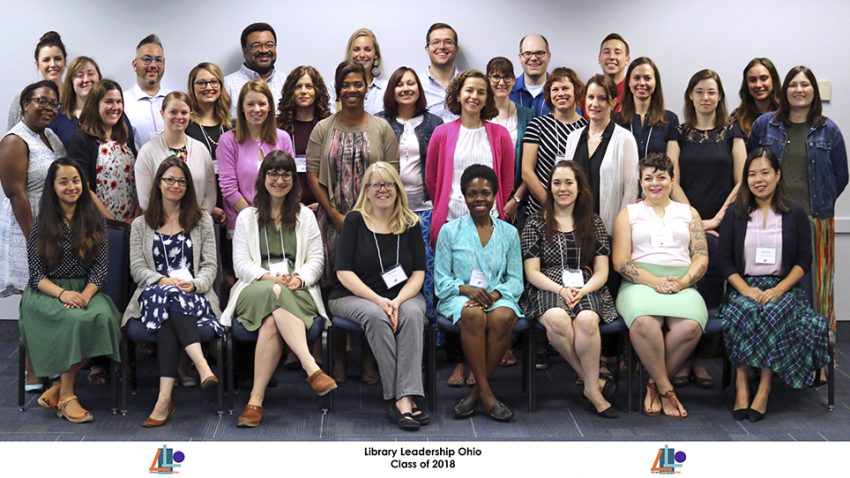
College of Engineering and Applied Science Libraries’ Hong Cheng (Global Service Librarian), Craig Person (Operations Manager & Student Supervisor) and UC Blue Ash Library’s Michelle McKinney (Reference and Web Services Librarian) participated in Library Leadership Ohio (LLO) 2018 in Columbus, OH.
The Ivy Library group, in coordination with OhioNet and the State Library of Ohio, facilitated the group of thirty-two librarians from across the state. The four day institute brought speakers from all areas and levels of the library profession. Participants were given the opportunity to learn, discuss and reflect on leadership skills, strengths, and career growth.
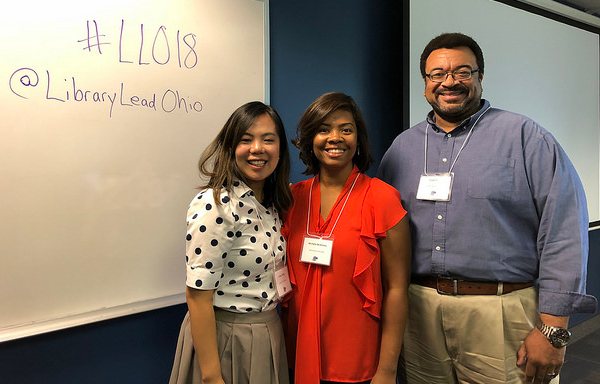
L-R: Hong Cheng, Michelle McKinney and Craig Person at Library Leadership Ohio 2018
Overall Impressions
Hong: I appreciated the opportunity to get to know myself better and more importantly realize how much I can contribute to the organization. I heard “community” throughout the training many times, and I am excited to work with my colleagues on building a happy and healthy community within and outside the library.
Michelle: This was just what I needed at this point in my career. I’ll be celebrating my thirteenth work anniversary in December and am in the midst of considering my professional future. LLO has allowed me the time to truly reflect on my accomplishments, skills and aspirations. It has also helped me to connect with others who are facing similar challenges. I’ve been lucky to have a strong group of library friends, colleagues and supporters and I feel I’ve grown that group as a result of this experience.
Craig: Seeing how I spent a good portion of my library career in Kentucky, I had not heard about the Library Leadership Ohio program. I am thankful beyond words for having had this opportunity. To be selected for the 2018 cohort was an honor. But the experience was something more than just the tangible items gathered, presentations viewed, or daily speakers. There were bonds and connections created through this shared experience that I can’t fully describe. I understand myself better, I see this library “world” with more definition, and I feel connected to something greater.
Hong, Michelle and Craig plan on sharing more about their LLO experience at an upcoming info session that has yet to be scheduled.
Native Voices Children’s Programming Event a Success
Last week several UC Libraries (HSL, CECH, Langsam) collaborated to produce the first installment in our Native Voices: Native Peoples’ Concepts of Health and Illness public programming. This inaugural event focused specifically on children as Langsam Library received a visit from twenty-four students of the Arlitt Child & Family Research & Education Center. Cheryl Ghosh, Senior Librarian at UC’s CECH Library put together an amazing program of dramatic skits, activity stations, and multi-media fun.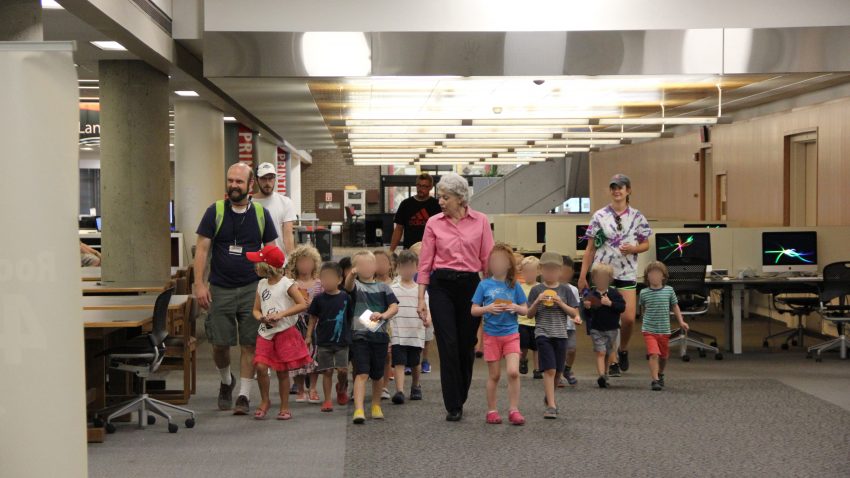
First, the 3 to 5-year-olds were treated to an introduction and brief play about the Iroquois legend of the Three Sisters and its corresponding gardening tradition. This tradition of planting corn, beans and squash (the sisters) in close proximity is widespread among Native American farming. At the same time the story functions as a metaphor for supporting and helping one another.
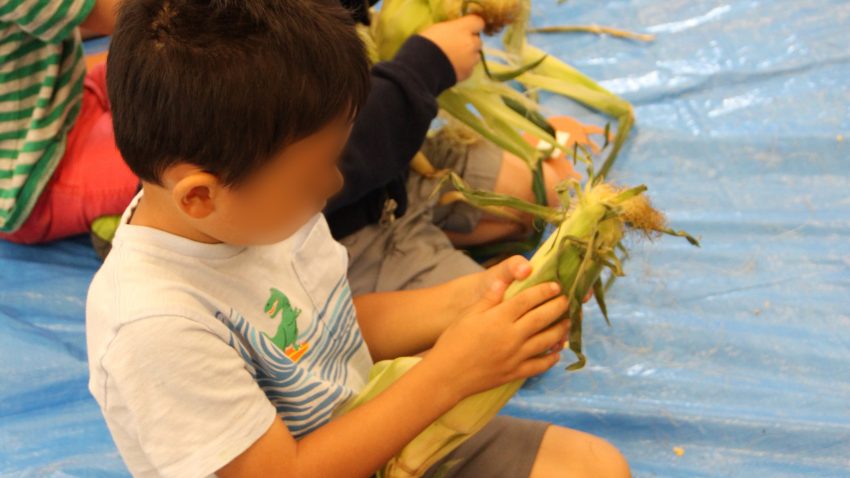
After the skit, the children were divided into groups and each group moved on to an activity station. One group and its chaperones built a teepee. The other, shucked corn and picked beans from bean plants. After ten minutes the groups switched and tried the other activity.
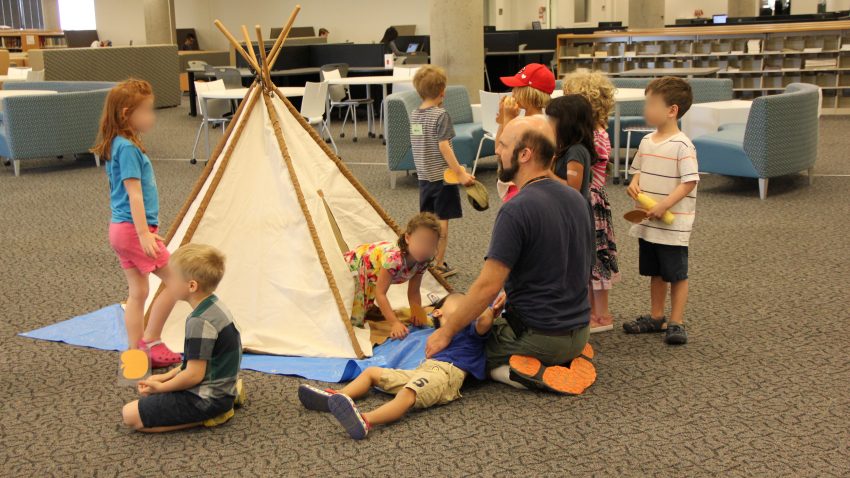
After fifteen minutes of activities, the students had a brief snack then proceeded to the Student Technology Resource Center (STAC) where video was taken of them in front of a green screen. At that point the video was superimposed onto an image of the Great Plains and an American Indian village complete with moving buffalo.
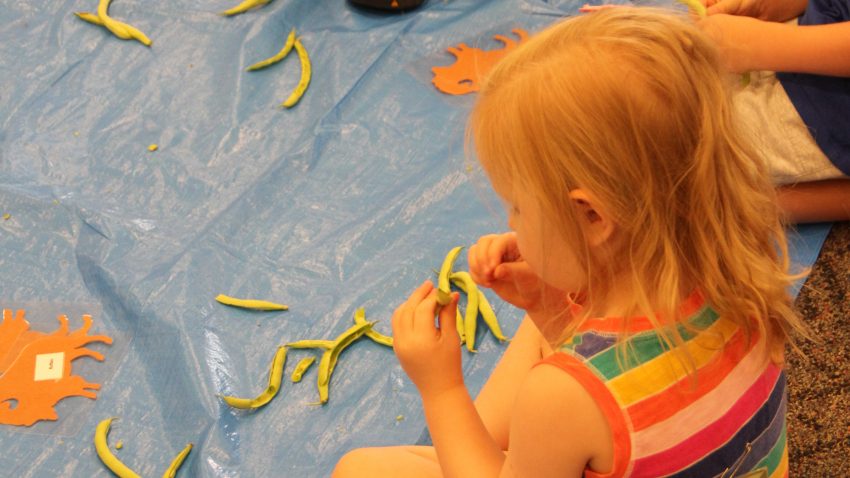 Finally, as a parting gift, each child received the book D is for Drum: A Native American Alphabet by Debbie and Michael Shoulders and Irving Toddy. The event lasted approximately an hour and at no time did our worries of waning attention spans among the children materialize. They never once lost interest. A success, if we do say so! And a huge thanks to all who assisted.
Finally, as a parting gift, each child received the book D is for Drum: A Native American Alphabet by Debbie and Michael Shoulders and Irving Toddy. The event lasted approximately an hour and at no time did our worries of waning attention spans among the children materialize. They never once lost interest. A success, if we do say so! And a huge thanks to all who assisted.
Please plan to attend the Native Voices: Native American Concepts of Health and Illness opening event on Thursday, July 26th in the CARE/Crawley Atrium of the UC Medical Sciences Building. And stay tuned for the six weeks of supplementary programming the HSL has planned.
Please see the gallery below for more images of the event.
- Students perform the Three Sisters story.
- The Kretschmer Collection of Native American Children’s Literature on display in the Langsam Library lobby
- At the end of the event each child was given a book to take home. The book purchase was made possible by Richard and Laura Kretschmer.
- Students watch as their video is superimposed onto an image of the Great Plains.
- Children shuck corn while being entertained by HSL/Winkler Associate Director, Lori Harris.
- Students watch as their video is superimposed onto an image of an Indian village.
Visit the Exhibit “Native Voices: Native People’s Concepts of Health and Illness” on Display Now in the Donald C. Harrison Health Sciences Library
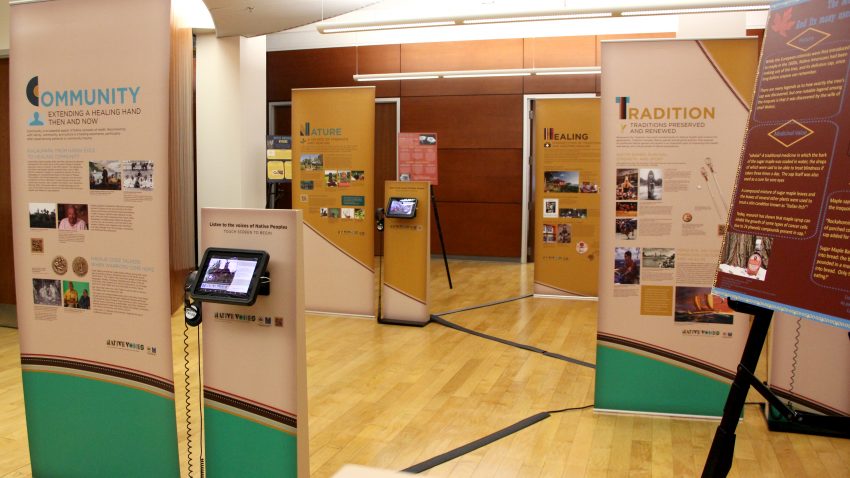 Native Voices: Native Peoples’ Concepts of Health and Illness, a traveling exhibition to U.S. libraries, is on display now through August 30 on the main level of the Donald C. Harrison Health Sciences Library.
Native Voices: Native Peoples’ Concepts of Health and Illness, a traveling exhibition to U.S. libraries, is on display now through August 30 on the main level of the Donald C. Harrison Health Sciences Library.
Native Voices explores the interconnectedness of wellness, illness and cultural life for Native Americans, Alaska Natives and Native Hawaiians. Stories drawn from both the past and present examine how health for Native People is tied to community, the land and spirit.
Through interviews that can be listened to via iPads located throughout the display, Native People describe the impact of epidemics, federal legislation, the loss of land and the inhibition of culture on the health of Native individuals and communities today.
Related Events
In association with the Native Voices exhibit, related events have been scheduled to explore the topic of Native Peoples’ Concepts of Health and Illness.
The first scheduled event is keynote speaker Suzanne L. Singer who will speak on Intersections of Energy and Wellness from 5-7:30 p.m., Thursday, July 26, in the CARE/Crawley Atrium (Medical Sciences Building, 231 Albert Sabin Way).
Throughout August, lectures that cover such topics as “The Contribution of Native Voices to Medicine through Botany,” “Breaking Bread: A Perspective of Fry Bread and Native Health” and “Preventing Tuberculosis while Regulating Indigenous Bodies” have been scheduled in the Stanley J. Lucas, MD, Board Room, E level of the Medical Sciences Building near the Kresge Circle.
A full schedule of events is listed online.
The U.S. National Library of Medicine (NLM) developed and produced Native Voices: Native Peoples’ Concepts of Health and Illness. The American Library Association (ALA) Public Programs Office, in partnership with NLM, tours the exhibition to America’s libraries. Native Voices: Native Peoples’ Concepts of Health and Illness was displayed at the NLM in Bethesda, Maryland, from 2011 to 2015. To learn more and view content from the exhibition, visit http://www.nlm.nih.gov/nativevoices.
~~~~~~~~~~~~~~~~~~~~~~~~~~~~~~~~~~~~~~~~~~~~~~~~~~~~
And don’t miss the exhibit “The Kretschmer Collection of Native American Children’s Literature donated by Drs. Richard and Laura Kretschmer” on display on the 4th floor lobby of the Walter C. Langsam Library. The exhibit features children’s books with Native American themes, written and illustrated by Native Americans and donated by Drs. Richard and Laura Kretschmer and housed in the College of Education, Criminal Justice and Human Services Library.
New Exhibit Features Children’s Books About and Created by Native Americans
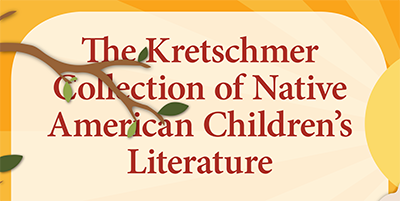 On display in the 4th floor lobby of the Walter C. Langsam Library, the exhibit “The Kretschmer Collection of Native American Children’s Literature donated by Drs. Richard and Laura Kretschmer” features children’s books with Native American themes, written and illustrated by Native Americans. The books are part of a collection of over 275 books donated by Drs. Richard and Laura Kretschmer and housed in the College of Education, Criminal Justice and Human Services (CECH) Library.
On display in the 4th floor lobby of the Walter C. Langsam Library, the exhibit “The Kretschmer Collection of Native American Children’s Literature donated by Drs. Richard and Laura Kretschmer” features children’s books with Native American themes, written and illustrated by Native Americans. The books are part of a collection of over 275 books donated by Drs. Richard and Laura Kretschmer and housed in the College of Education, Criminal Justice and Human Services (CECH) Library.
Also included in the exhibit are Native American history and culture resources from the collections of UC Libraries. Included are movies, e-journals and online digital collections and databases.
The exhibit was designed by Sophia Xu, design student in the College of Design, Architecture, Art and Planning and UC Libraries’ Communications Department design co-op student, and curated by Cheryl Ghosh, head of the CECH Library. The exhibit is done in conjunction with the traveling exhibition “Native Voices: Native Peoples’ Concepts of Health and Illness,” on display in the Donald C. Harrison Health Sciences Library July 23-August 30.
Health Sciences Library Positions Available – Please Apply
The Health Science Library is currently accepting applications for student assistants.
Positions are now open in the following Departments
- Circulation
- Winkler Center
Positions require a commitment of at least 6 – 15 hours per week. Some positions require a Federal Work Study Grant.
The library is located, near the main elevator banks, on the E level of the Medical Science Building, on the Medical campus.
Please fill out the Library specific application. Be sure to mark HSL as a preferred job site.
For questions concerning the Circulation Department,
Email: bacheldn@ucmail.uc.edu
For questions concerning the Winkler Center,
Email: pasigo@ucmail.uc.edu
Ohio Digital Newspapers & Chronicling America Presentation in ARB on Thursday July 26
Come hear about Ohio’s digital newspaper project and learn how to freely access historic newspapers from around the country.
When: Thursday July 26 from 11:00am-12:30pm
Where: Archives and Rare Books Library, Seminar Room 814
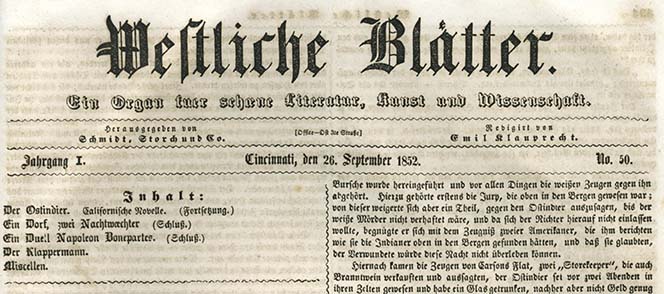 Did you know that 90 Ohio newspapers including foreign language papers have been digitized and are now part of the Library of Congress’ free newspaper database Chronicling America? Learn how to access the over 13 million pages of historic newspapers from 47 states and territories covering 1789-1963 on Chronicling America. Jenni Salamon, Coordinator for the Ohio Digital Newspaper Program, and Bronwyn Benson, Quality Control Technician, from the Ohio History Connection will demonstrate basic and advanced search strategies and how to work with your results to find information about local, state, national and international events, people, places and culture. They will also provide a brief overview newspaper digitization process and an update on the digitization of Ohio’s foreign language newspapers.
Did you know that 90 Ohio newspapers including foreign language papers have been digitized and are now part of the Library of Congress’ free newspaper database Chronicling America? Learn how to access the over 13 million pages of historic newspapers from 47 states and territories covering 1789-1963 on Chronicling America. Jenni Salamon, Coordinator for the Ohio Digital Newspaper Program, and Bronwyn Benson, Quality Control Technician, from the Ohio History Connection will demonstrate basic and advanced search strategies and how to work with your results to find information about local, state, national and international events, people, places and culture. They will also provide a brief overview newspaper digitization process and an update on the digitization of Ohio’s foreign language newspapers.
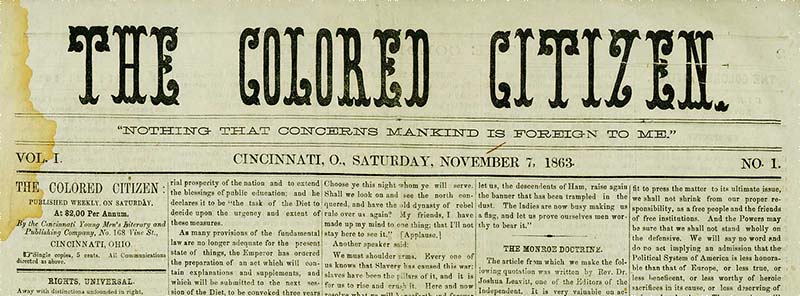 Treasures from the Archives and Rare Books Library collections including items from the German Americana collection that complement the digitized newspapers will be available for viewing before and after the presentation.
Treasures from the Archives and Rare Books Library collections including items from the German Americana collection that complement the digitized newspapers will be available for viewing before and after the presentation.



